

16 Personalities. Often the very first question people ask after completing our personality test is “What do these four letters mean?”
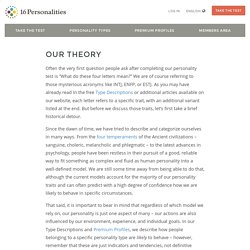
We are of course referring to those mysterious acronyms like INTJ, ENFP, or ESTJ. As you may have already read in the free Type Descriptions or additional articles available on our website, each letter refers to a specific trait, with an additional variant listed at the end. But before we discuss those traits, let’s first take a brief historical detour. Since the dawn of time, we have tried to describe and categorize ourselves in many ways. From the four temperaments of the Ancient civilizations – sanguine, choleric, melancholic and phlegmatic – to the latest advances in psychology, people have been restless in their pursuit of a good, reliable way to fit something as complex and fluid as human personality into a well-defined model. Our approach has its roots in two different philosophies. You’ll recall these terms from the paragraphs dedicated to Jung. Mind Energy Nature.
Why the Myers-Briggs test is totally meaningless. Rorschach & Freudians: Crash Course Psychology #21. Intro to the Myers-Briggs Personality Test. Descriptions of the 8 Letters. Each personality type consists of 4 different letters.
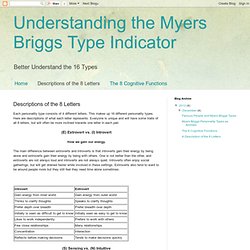
This makes up 16 different personality types. Here are descriptions of what each letter represents. Everyone is unique and will have some traits of all 8 letters, but will often be more inclined towards one letter in each pair. (E) Extrovert vs. (I) Introvert How we gain our energy. The main difference between extroverts and introverts is that introverts gain their energy by being alone and extroverts gain their energy by being with others. (S) Sensing vs. How we take in information. The main difference between sensing and intuition is that sensors take in information via their five senses and through facts, and intuitives take in information via patterns, impressions ands possibilities.
(T) Thinking vs. How we make decisions. The main difference between thinking and feeling is that thinkers make decisions based on facts, and feelers make decisions based on values. (J) Judging vs. Personality Types and Importance in Gamification. Personality types refers to the psychological classification of different types of individuals.[1] In relation to Gamification it is also commonly referred to as Player Type and is thought by many to be an important design consideration in the Gamification Process and Game Design.
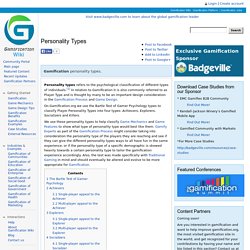
On Gamification.org we use the Bartle Test of Gamer Psychology types to classify Player Personality Types into four types: Achievers, Explorers, Socializers and Killers. We use these personality types to help classify Game Mechanics and Game Features to show what type of personality type would best like them. Gamify Experts as part of the Gamification Process might consider taking into consideration the personality type of the players they are reaching and see if they can give the different personality types ways to all have fun in the same experience, or if the personality type of a specific demographic is skewed heavily towards a certain personality type to tailor the gamification experience accordingly.
The 4 MBTI Function Pairs. Myers-Briggs and Productivity. Free Personality Test. Members Login Log in to your account below: Enter your e-mail address to receive a reset link.
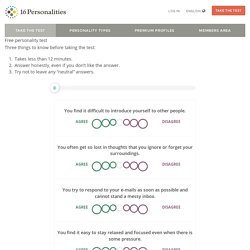
Forgot password? Not a member yet? Understanding the Myers Briggs Type Indicator: Descriptions of the 8 Letters. Personality Types. Members Login Log in to your account below: Enter your e-mail address to receive a reset link.
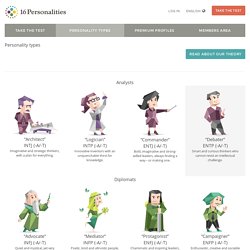
Forgot password? Not a member yet? Take our personality test and join in the results screen! Personality types Analysts “Architect” Imaginative and strategic thinkers, with a plan for everything. “Logician” Innovative inventors with an unquenchable thirst for knowledge. “Commander” Bold, imaginative and strong-willed leaders, always finding a way – or making one. “Debater” Smart and curious thinkers who cannot resist an intellectual challenge.
Diplomats “Advocate” Quiet and mystical, yet very inspiring and tireless idealists. “Mediator” Poetic, kind and altruistic people, always eager to help a good cause. “Protagonist” Charismatic and inspiring leaders, able to mesmerize their listeners. “Campaigner” Enthusiastic, creative and sociable free spirits, who can always find a reason to smile. Sentinels. Briggs Myers' 16 Personality Types: In-Depth Profiles. Get in-depth information on Briggs Myers' 16 personality types, including top careers, relationships, and core values and motivations.
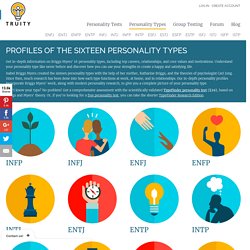
Understand your personality type like never before and discover how you can use your strengths to create a happy and satisfying life. Isabel Briggs Myers created the sixteen personality types with the help of her mother, Katharine Briggs, and the theories of psychologist Carl Jung. Since then, much research has been done into how each type functions at work, at home, and in relationships. Our in-depth personality profiles incorporate Briggs Myers' work, along with modern personality research, to give you a complete picture of your personality type.